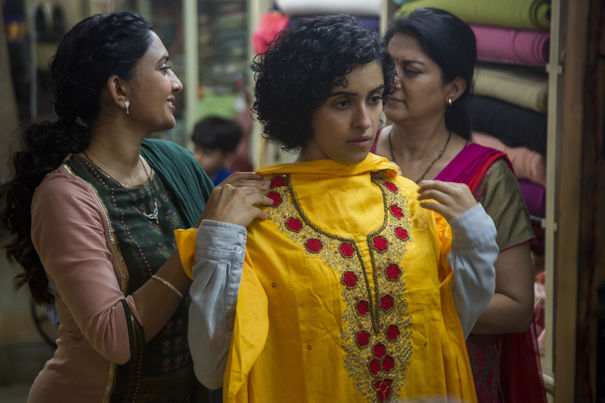Vignettes of the Great Indian Romantic Hypocrisy
By Poulomi Das

© Joe D'Souza / 2018 Tiwari's Ghost, LLC. All Rights Reserved
There is an inceptive sequence in Ritesh Batra’s PHOTOGRAPH that reproduces the chasm between force-feeding traditional biases and brandishing a somewhat performative modernism that cosmopolitan India invariably struggles with. The film – which has its European premiere in the 2019 Berlinale Special Gala section – opens with a telling moment. A middle-aged, upper-caste father fishes out his phone to take a photograph of a public billboard that features the face of his topper daughter – a progressive move in a country that still chooses to rear women as domestic employees. But in the contrasting next scene, his daughter, Miloni (Sanya Malhotra), out shopping with her mother and aunt, is made to stare unblinkingly at the mirror while they fuss over a “kurta” (a traditional tunic) for her. Even though there is an illusion of Miloni being able to make up her own mind over something as quotidian as her wardrobe, her family does not deem it necessary to wait for her decision – in a matter of minutes, they decide that pink suits her. Miloni’s expressionless face nods in delayed approval, crafted in such an organic way that it will resonate with Indian women who are made to look at their diminishing agency over their own body as a way of life.
PHOTOGRAPH’s predominant preoccupation – and in a way, its central conceit – is the chance meeting between two contrasting parts of Mumbai: The lower-class Muslim Rafi (Nawazuddin Siddiqui), a photographer making a living by clicking tourists at the Gateway of India and Miloni, a submissive girl sheltered in an affluent yet conservative Gujarati household. It is easy to assume that Batra would mine these two misfits and treat us to the lush, gentle portrait of longing and courtship from the prism of human intimacy like he did in LUNCHBOX (2013) and OUR SOULS AT NIGHT (2017), but PHOTOGRAPH boasts of probably the oldest – and most abused – romantic template: star-crossed romance. What sets PHOTOGRAPH’s rendition apart is how it exposes its futility in the Indian context that puts societal stratification on a pedestal.
It is precisely this irony – which can feel unrewarding at times – that Batra subtly extends in PHOTOGRAPH: The abject class hierarchy in a city that romanticises its thriving multiculturality through an unusually tender rendering of a dispiriting courtship trajectory. Both Rafi and Miloni lead almost robotic lives for others, have zero agency over their aspirations, and yet Batra takes his time to gently reveal that their lives are not designed to find solace in each other. At one point, Rafi’s roommate echoes this thread when he doubts that Miloni is really interested in him, “She is fair, urban, way above your league; who will believe that she chose to be with you?” Batra’s interpretation of the quintessential doomed lovers template plays out in an intriguing non-linear and slow burn approach that culminates in a flashback ending that is as audacious as it is critical of the expected mainstream narrative. Like PHOTOGRAPH convincingly posits, in India, star-crossed romance is a victim of class segregation, never an outcome of agency.

